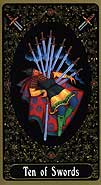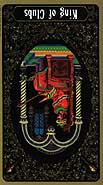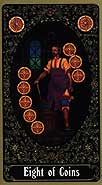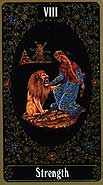| The Fourfold Vision spread offers a progression of different ways of looking at an object, person, or situation. It is a powerful tool for gaining deeper insight into the specific subjects of other readings. The Russian Tarot of Saint Petersburg is the final commissioned work of Yuri Shakov, a master in the lost art of Russian miniature painting. The rich, dark images lend themselves to questions regarding the struggle of the human spirit in trying times. If you would like your own copy of the Russian Tarot of Saint Petersburg, you can buy it now! |
 | The card on the far right represents the object being viewed, be it an idea, relationship, or the self. Ten of Swords (Ruin): Ruin. Pain Affliction. Anguish. Desolation. Misfortune. Disappointment. |
 | The card second from the right represents the physical vision: how the object is seen at a base or mechanical level. King of Clubs, when reversed: Severity. Austerity. Excessive and exaggerated ideas. Dogmatic. Deliberate. |
 | The card in the middle represents the mental vision: the object personified and seen through a humanized perspective. Eight of Coins (Prudence): Apprenticeship. Craftsmanship. Quickness to learn. Candor. Modesty. Handiwork. Personal effort. |
 | The card second from the left represents the emotional vision: how passions and values are creatively stimulated by the mental vision. Strength: Strength. Courage. Conviction. Energy. Defiance. Action. Confidence. Zeal. Matter over mind or mind over matter. |
 | The card on the far left represents the fourfold or mystical vision: still viewing through the previous three, we now add a spiritual element, revealing unseen aspects of the object. The Lovers: Love. Beauty. Perfection. Harmony. Trust. Beginning of a romance. Deep feeling. Optimism. Freedom of emotion. The necessity of testing or subjecting to trial. Struggle between sacred and profane love. A meaningful affair. |









